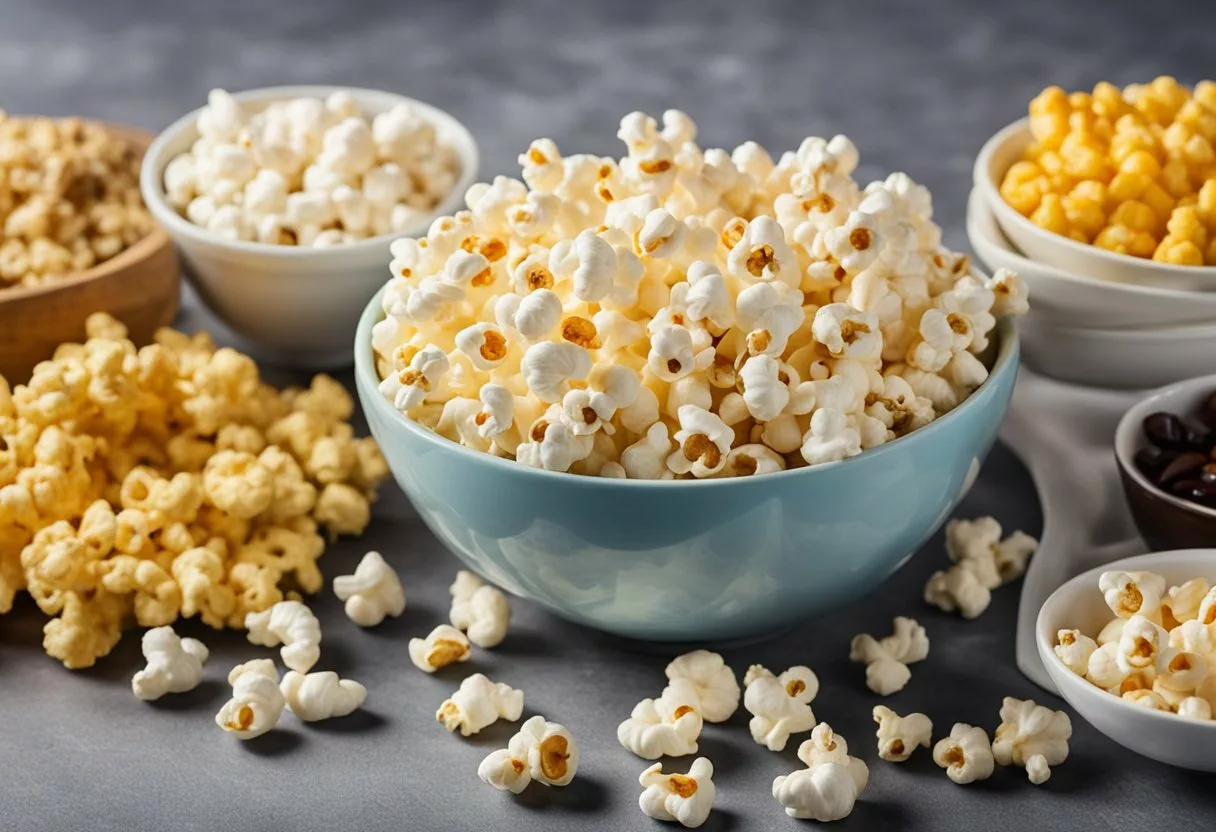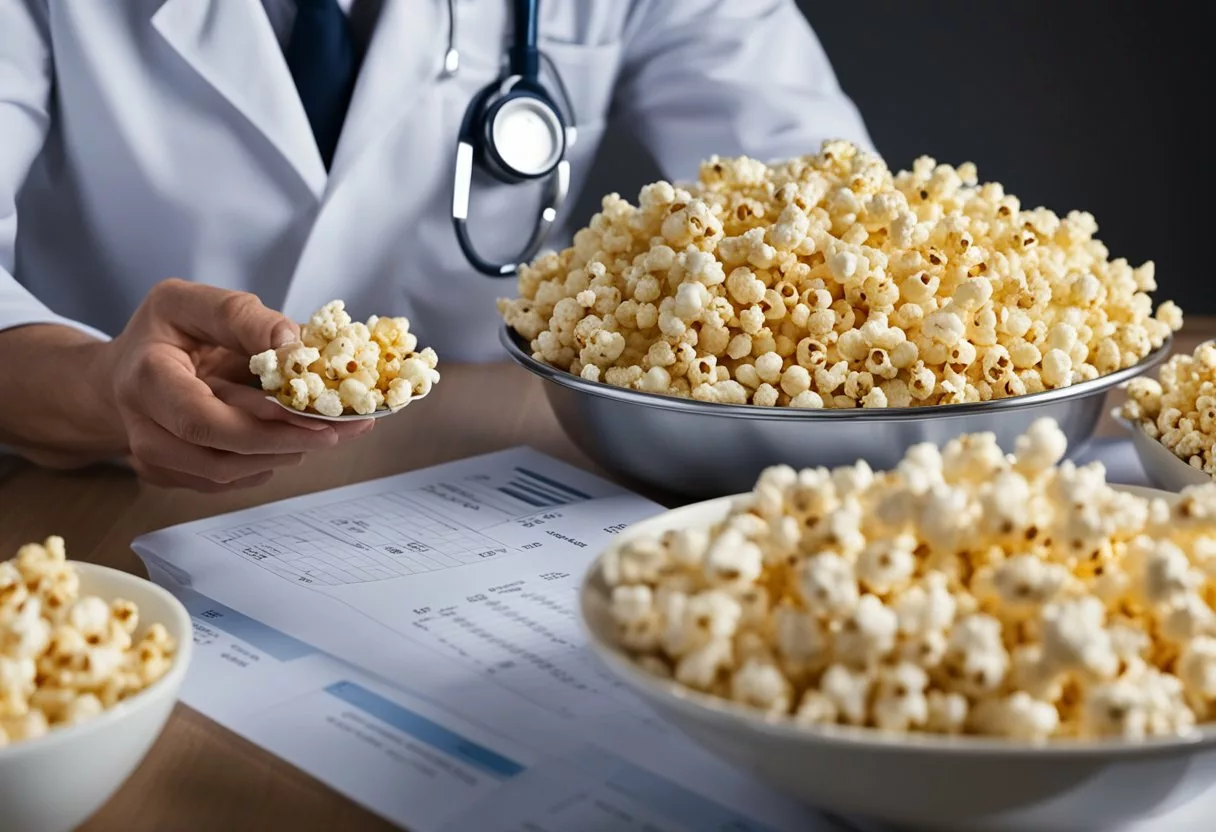Eating popcorn is a favorite pastime for many people. Whether it’s at the movies or as a snack at home, popcorn is a popular choice. But have you ever wondered what happens to your body if you eat popcorn every day?

Popcorn is a whole grain that is naturally low in calories. However, the way it is prepared and consumed can greatly affect its nutritional value. For example, movie theater popcorn is often loaded with butter and salt, making it a high-calorie and high-sodium snack. On the other hand, air-popped popcorn with minimal added salt or butter can be a healthier option.
While popcorn can be a healthy snack choice, eating it every day may not be the best idea. Popcorn is a high-fiber food, which can be beneficial for digestion. However, consuming too much fiber can lead to digestive issues such as bloating and gas. Additionally, eating popcorn every day can lead to an overconsumption of salt and unhealthy fats, which can increase the risk of health problems such as high blood pressure and heart disease.
Nutritional Profile of Popcorn

Whole Grain Benefits
Popcorn is a type of whole grain that is low in calories and high in fiber. According to WebMD, whole grains can help reduce the risk of heart disease, stroke, and type 2 diabetes. Popcorn is also a good source of complex carbohydrates, which provide energy to the body.
Fiber Content
Popcorn is a great source of dietary fiber. One cup of air-popped popcorn contains about 1 gram of fiber, while one cup of oil-popped popcorn contains about 1.2 grams of fiber. Fiber can help regulate digestion, lower cholesterol levels, and promote feelings of fullness.
Vitamins and Minerals
Popcorn is a good source of several vitamins and minerals. Popcorn contains small amounts of vitamins B6, E, and K, as well as minerals such as iron, calcium, and potassium. These vitamins and minerals are essential for maintaining healthy bones, muscles, and other bodily functions.
Antioxidant Properties
Popcorn contains antioxidants called polyphenols, which are plant compounds that have been linked to various health benefits. According to The List, polyphenols can help reduce inflammation in the body and lower the risk of chronic diseases such as cancer and heart disease. Popcorn also contains phenolic acids, which have antioxidant properties that can help protect cells from damage.
In summary, popcorn is a nutritious snack that can provide several health benefits. It is a good source of fiber, complex carbohydrates, vitamins, minerals, and antioxidants. However, it is important to note that the nutritional value of popcorn can vary depending on how it is prepared. For example, popcorn that is prepared with oil and topped with butter or salt can be high in calories and unhealthy fats. Therefore, it is best to enjoy popcorn in moderation and choose healthier preparation methods, such as air-popping or lightly seasoning with herbs and spices.
Health Impacts of Daily Popcorn Consumption

Digestive Health
Popcorn is a whole grain that is high in fiber content. Fiber is essential for maintaining a healthy digestive system. It helps prevent constipation by adding bulk to the stool, making it easier to pass. Additionally, fiber feeds the good bacteria in the gut, which helps to maintain a healthy gut microbiome. The American Heart Association recommends that adults consume at least 25 grams of fiber per day for optimal digestive health.
Weight Management
Popcorn is a low-calorie snack that can be a great addition to a weight loss diet. Three cups of air-popped popcorn contain only 93 calories. Additionally, popcorn is a whole grain, which means it is more filling than refined grains. This can help prevent overeating and aid in weight loss.
Blood Sugar Regulation
Popcorn has a low glycemic index, meaning it does not cause a rapid spike in blood sugar levels. This makes it a good snack option for individuals with diabetes or those looking to manage blood sugar levels. However, it is important to note that toppings such as butter and sugar can increase the glycemic index of popcorn.
Heart Health
Popcorn can be a heart-healthy snack when consumed in moderation. The high fiber content in popcorn can help lower LDL cholesterol, also known as “bad cholesterol.” High levels of LDL cholesterol can increase the risk of heart disease. Additionally, popcorn is low in sodium, which can help lower blood pressure. It is important to note that movie theater popcorn can be high in calories and sodium, so it is best to opt for air-popped popcorn or popcorn with minimal toppings.
In conclusion, daily popcorn consumption can have several positive health impacts, including improved digestive health, weight management, blood sugar regulation, and heart health. However, it is important to consume popcorn in moderation and choose healthy toppings to maximize its health benefits.
Risks and Downsides
Caloric and Fat Content
Popcorn can be a healthy snack when consumed in moderation, but it is important to be mindful of its caloric and fat content. A cup of air-popped popcorn has only 31 calories and 0.4 grams of fat, while a cup of oil-popped popcorn has 55 calories and 2.7 grams of fat. However, when popcorn is topped with butter or other high-calorie toppings, the calorie and fat content can increase significantly.
Sodium and Blood Pressure
Another factor to consider when consuming popcorn regularly is its high sodium content. According to USA Today, a medium-sized popcorn at the movie theater can contain up to 1,200 milligrams of sodium, which is more than half of the recommended daily intake of sodium. High sodium intake can lead to high blood pressure, which increases the risk of heart disease and stroke.
Chemical Additives
Popcorn may also contain chemical additives, such as diacetyl, which is used to give popcorn its buttery flavor. According to The Healthy, diacetyl has been linked to lung damage when inhaled in large amounts by workers in microwave popcorn factories. While the risk to consumers is low, it is important to be aware of the potential risks associated with chemical additives.
Allergies and Intolerances
Finally, it is important to note that some people may have allergies or intolerances to popcorn. According to Parade, popcorn can be a common trigger for those with food sensitivities, such as those with celiac disease or gluten intolerance. Additionally, some people may experience digestive issues, such as bloating or gas, when consuming popcorn regularly.
Overall, while popcorn can be a healthy snack option when consumed in moderation, it is important to be mindful of its caloric and fat content, sodium content, and potential risks associated with chemical additives and allergies.
Popcorn Varieties and Preparation Methods
Air-Popped Popcorn
Air-popped popcorn is considered the healthiest option as it does not require any oil or additives. It is a low-calorie snack that is high in fiber and antioxidants. Air-popped popcorn is also a good source of whole grains. It is a great option for those who are health-conscious and want to avoid unhealthy additives.
Microwave Popcorn
Microwave popcorn is a convenient option for those who want to enjoy popcorn without having to go through the hassle of preparing it. However, it is important to note that most microwave popcorn brands contain additives such as butter and salt, which can be unhealthy when consumed in excess. It is best to opt for healthier microwave popcorn options that are free of unhealthy additives.
Oil-Popped Popcorn
Oil-popped popcorn is a popular option for those who prefer a more traditional taste. However, it is important to choose a healthy oil, such as coconut oil or olive oil, to avoid consuming unhealthy fats. Oil-popped popcorn can also be flavored with savory or sweet flavorings, such as cheese or caramel.
Flavored Popcorn
Flavored popcorn is a popular option for those who prefer a more indulgent taste. However, it is important to note that most flavored popcorn brands contain unhealthy additives such as artificial flavorings and preservatives. It is best to opt for healthier flavored popcorn options that are free of unhealthy additives.
When it comes to popcorn, the preparation method and variety can greatly affect its nutritional value. Air-popped popcorn is the healthiest option, followed by microwave popcorn that is free of unhealthy additives. Oil-popped popcorn can also be a healthy option when prepared with healthy oil, and flavored popcorn can be enjoyed in moderation when made with natural, healthy ingredients.
Healthy Popcorn Eating Habits

Portion Control
While popcorn can be a healthy snack, it is important to practice portion control. Eating too much popcorn can lead to weight gain, so it is recommended to stick to a serving size of 3 cups of air-popped popcorn. This serving size contains only 93 calories and 1.1 grams of fat, making it a nutritious snack option.
Choosing Healthy Toppings
When it comes to toppings, it is important to choose healthy options. Instead of butter, try using avocado oil, which is a healthier fat option. Nutritional yeast is a great alternative to cheese, providing a cheesy flavor without the added fat and calories. For a spicy kick, try adding lime, chili powder, or curry powder to your popcorn.
Incorporating Popcorn into a Balanced Diet
While popcorn can be a healthy snack option, it is important to incorporate it into a balanced diet. A dietitian can help create a meal plan that includes popcorn as a nutritious snack. It is also important to remember that popcorn should not replace other nutritious foods in the diet.
Overall, popcorn can be a healthy snack option when eaten in moderation and with healthy toppings. By practicing portion control and incorporating popcorn into a balanced diet, it can be a great addition to a weight management plan.
Cultural and Social Aspects of Popcorn

Popcorn in American Culture
Popcorn has been a part of American culture for centuries. It was first introduced to the colonists by Native Americans who used it for both food and decoration. In the 1800s, popcorn started to gain popularity as a snack food, and by the early 1900s, it had become a staple at circuses, fairs, and other public events. Today, popcorn is a ubiquitous snack food in the United States and is enjoyed by people of all ages.
Popcorn as a Movie Snack
One of the most popular places to enjoy popcorn is at the movie theater. Movie theater popcorn is known for its delicious buttery flavor and is often associated with the movie-going experience. In fact, many people say that they can’t imagine going to the movies without a bag of popcorn. While movie theater popcorn is often high in calories and fat, it is still a beloved snack that many people enjoy.
Homemade Popcorn Recipes
While movie theater popcorn is popular, many people also enjoy making popcorn at home. There are many different recipes and methods for making popcorn, from air-popped to stove-top to microwave. Some people like to experiment with different seasonings and toppings, such as butter, salt, cheese, and even chocolate. Homemade popcorn is a fun and easy snack that can be enjoyed in the comfort of your own home.
Overall, popcorn is a beloved snack food in the United States that is enjoyed by people of all ages. Whether you’re at the movie theater or at home, there are many different ways to enjoy this delicious and versatile snack.
Expert Opinions and Recommendations

Dietary Guidelines
According to the USDA’s Dietary Guidelines, popcorn can be a healthy snack option when consumed in moderation. It is a whole grain food that is low in calories and high in fiber. However, it is important to choose plain popcorn without added salt, butter, or other toppings that can increase the calorie and fat content.
Registered dietitians (RDs) also recommend consuming popcorn in moderation and choosing air-popped popcorn over microwave popcorn. RDs suggest avoiding popcorn with added artificial flavors and colors, as well as avoiding consuming popcorn as a replacement for more nutrient-dense foods.
American Heart Association’s Stance
The American Heart Association recommends limiting the consumption of added salt, saturated fat, and trans-fat, which are commonly found in microwave popcorn. They suggest choosing air-popped popcorn or making popcorn at home with minimal added salt and healthy fats, such as olive oil.
The American Heart Association also recommends consuming a variety of nutrient-dense foods, such as fruits, vegetables, whole grains, lean proteins, and low-fat dairy products. Popcorn can be a part of a healthy diet when consumed in moderation and as a part of a balanced meal plan.
It is important to note that while popcorn can be a healthy snack option, consuming popcorn every day may not be necessary or recommended for everyone. It is important to listen to your body and consume foods in moderation to maintain a healthy and balanced diet.
Disclaimer: The information provided in this section is for educational purposes only and does not constitute medical advice. Please consult a healthcare professional before making any dietary changes.